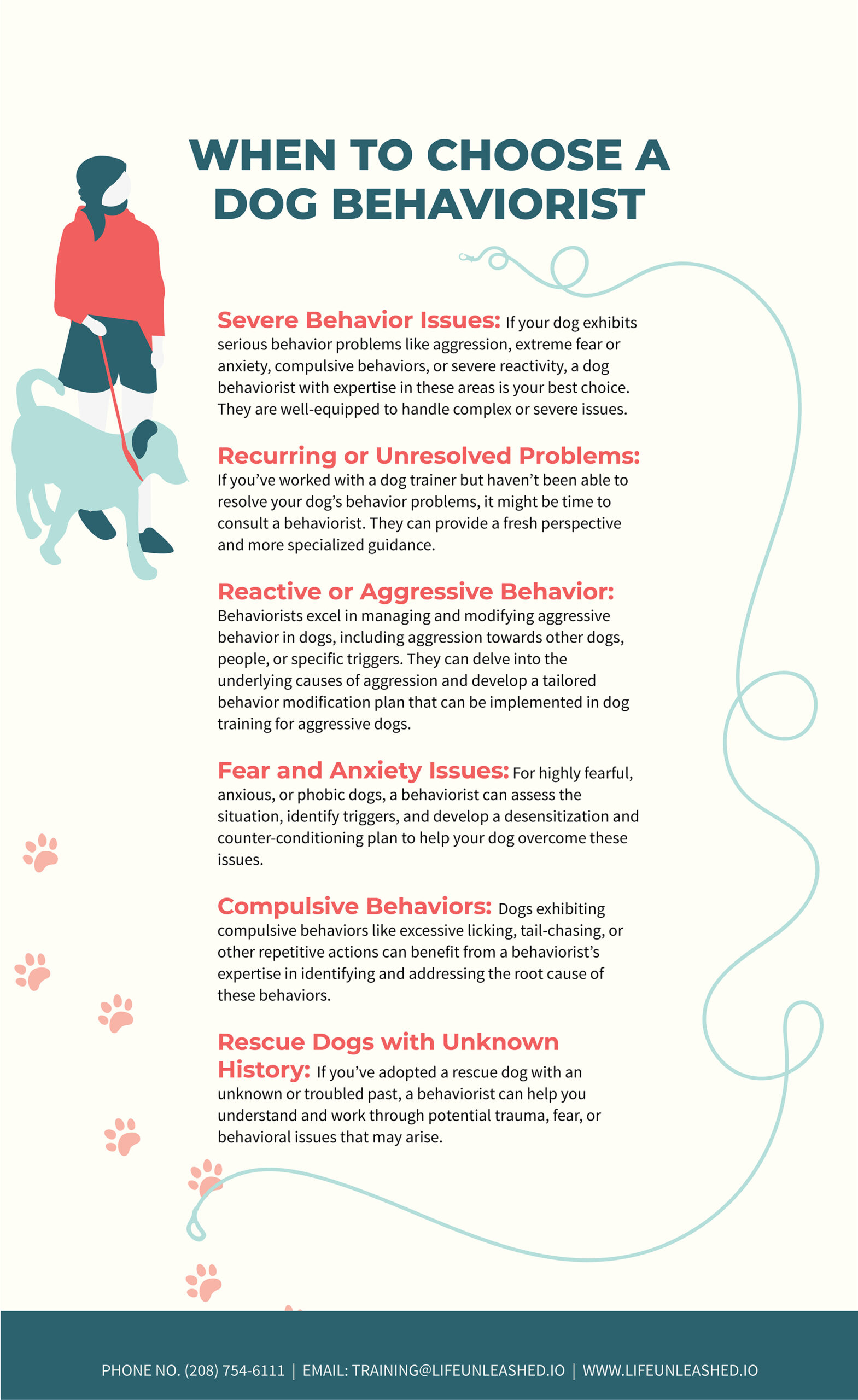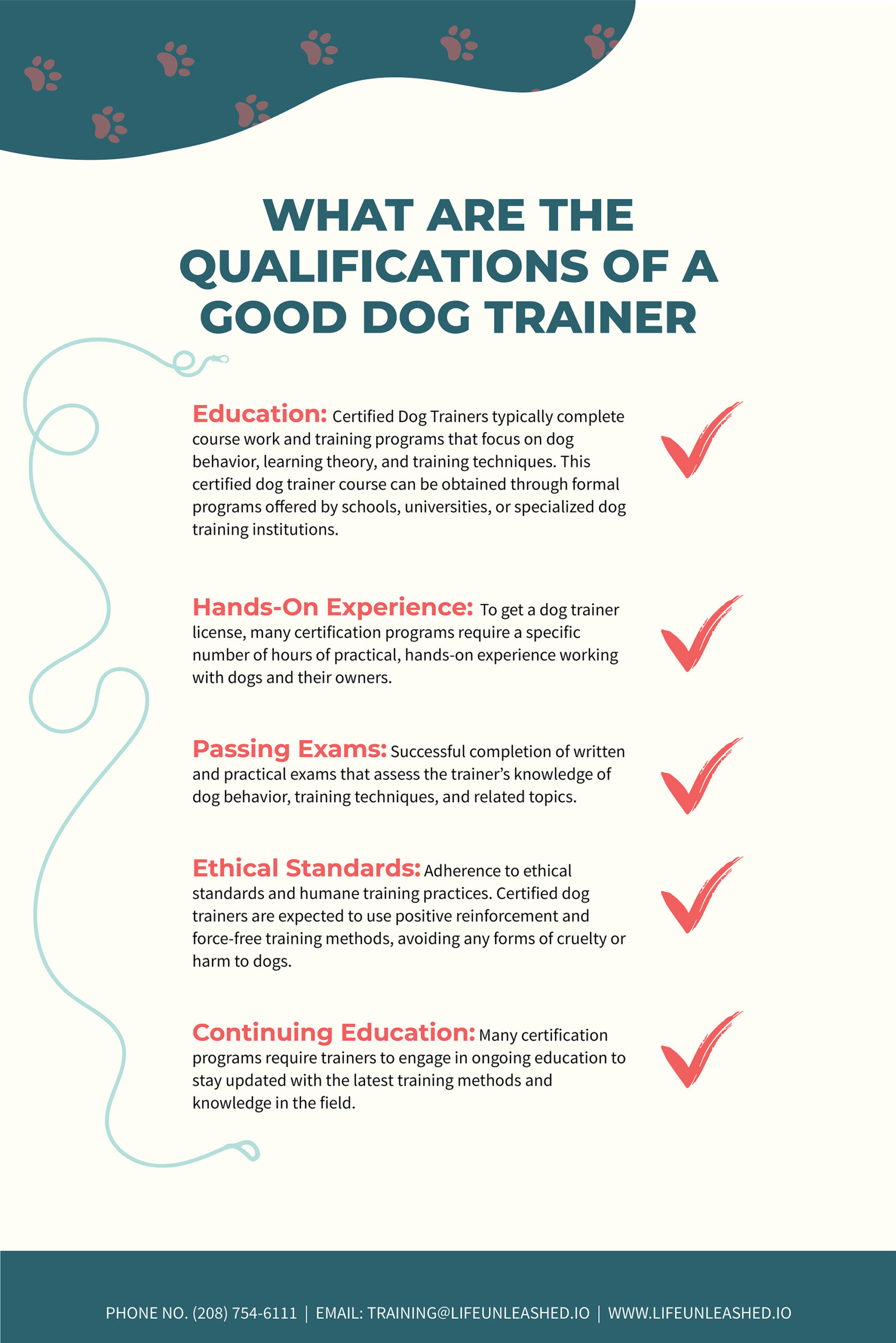Ever heard of: “People are great, but let’s face it: They have nothing on dogs.”? Or, “Love is a wet nose and a happy tail”? Or better yet, “You can’t buy happiness, but you can adopt it?”
These aren’t just cute sayings: they are truths spoken by dog lovers around the world.
It’s no wonder that the connection we share with our dogs is a unique and cherished one. But what do we do when our beloved furry friends, our partners in adventure, start barking up the wrong tree (both figuratively and literally)? It’s a sign that it’s time to act, and to act swiftly.
So, where do you turn for help in these moments?
Some dog owners choose to seek out a dog trainer, while others are attracted to dog behaviorists. It’s unfortunate that these two terms, dog behaviorist vs trainer, are often used interchangeably, but they have some fundamental differences. That’s why we’re here to explore the world of dog behaviorists vs certified dog trainers and guide you through this important decision.
What’s A Dog Behaviorist: Unraveling the Canine Mind
First things first, let’s clarify what a dog behavioral specialist is. A dog behaviorist is a professional who’s a genuine expert in comprehending and addressing the behavior of dogs. These dog wizards usually possess an in-depth understanding of dog psychology, a bag full of training techniques, and the knack for evaluating and modifying a dog’s behavior to address a wide array of issues while enhancing their overall well-being.
What Certifications Are Available for Dog Behaviorists?
While there’s no strict certification or licensing requirement for dog behaviorists, various certifications and credentials can prove a dog behaviorist’s expertise and dedication to their field. These certifications go a long way in boosting their credibility and assuring clients that they’ve received proper training and education in dog behavior. Here are some notable certifications and organizations in the realm of dog behavior:
- Certified Professional Dog Trainer (CPDT-KA or CPDT-KSA): The Certification Council for Professional Dog Trainers (CCPDT) offers two types of certifications: Certified Professional Dog Trainer-Knowledge Assessed (CPDT-KA) and Certified Professional Dog Trainer-Knowledge and Skills Assessed (CPDT-KSA). These certifications showcase a trainer’s expertise in working with dogs and addressing behavior issues.
- Certified Applied Animal Behaviorist (CAAB): Certified Applied Animal Behaviorists typically hold advanced degrees, often a Ph.D. in a related field, and demonstrate expertise in animal behavior, including dogs.
- Associate Certified Applied Animal Behaviorist (ACAAB): Similar to CAAB, but tailored for professionals with a master’s degree in a related field and demonstrated expertise in animal behavior.
- International Association of Canine Professionals (IACP) Certified Dog Trainer: The IACP offers certification for dog trainers, including those specializing in behavior modification.
- Karen Pryor Academy Certified Training Partner (KPA CTP): This certification focuses on positive reinforcement training methods and is recognized for trainers who employ force-free and science-based training techniques.
- American Kennel Club (AKC) Canine Good Citizen Evaluator: Although not a behaviorist certification, becoming an AKC CGC evaluator demonstrates expertise in dog behavior and training. It allows individuals to evaluate and certify dogs for the AKC Canine Good Citizen program.
- Other Educational Programs: Many reputable educational programs and workshops in dog behavior and training provide certificates of completion. For example, organizations like the International Association of Canine Professionals, the Association of Professional Dog Trainers, and the Karen Pryor Academy offer certificates to graduates.
When to Choose a Certifed Dog Behaviorist
So, when is it time to call in a dog behaviorist? Here are some red flags and situations that might indicate it’s time to consult a dog behaviorist:

- Severe Behavior Issues: If your dog exhibits serious behavior problems like aggression, extreme fear or anxiety, compulsive behaviors, or severe reactivity, a dog behaviorist with expertise in these areas is your best choice. They are well-equipped to handle complex or severe issues.
- Recurring or Unresolved Problems: If you’ve worked with a dog trainer but haven’t been able to resolve your dog’s behavior problems, it might be time to consult a certifed dog behaviorist. They can provide a fresh perspective and more specialized guidance.
- Reactive or Aggressive Behavior: Behaviorists excel in managing and modifying aggressive behavior in dogs, including aggression towards other dogs, people, or specific triggers. They can delve into the underlying causes of aggression and develop a tailored behavior modification plan that can be implemented in dog training for aggressive dogs.
- Fear and Anxiety Issues: For highly fearful, anxious, or phobic dogs, a behaviorist can assess the situation, identify triggers, and develop a desensitization and counter-conditioning plan to help your dog overcome these issues.
- Compulsive Behaviors: Dogs exhibiting compulsive behaviors like excessive licking, tail-chasing, or other repetitive actions can benefit from a behaviorist’s expertise in identifying and addressing the root cause of these behaviors.
- Rescue Dogs with Unknown History: If you’ve adopted a rescue dog with an unknown or troubled past, a behaviorist can help you understand and work through potential trauma, fear, or behavioral issues that may arise.
When considering a dog behaviorist, opt for one with the relevant certifications, substantial experience, and a humane, science-based approach to behavior modification. It’s always a good idea to consult your veterinarian too, as they can rule out any underlying medical issues that may contribute to your dog’s behavior problems.
What’s a Certified Dog Trainer: The Art of Canine Etiquette
Certified dog trainers, on the other hand, are the masters of teaching your dog basic skills, commands, and good manners.
Did you know that the dog training industry is entirely unregulated?
That means practically anyone can call themselves a dog trainer. This is precisely why it is important to know how to pick the best dog trainer for your furry companion.
A Certified Dog Trainer is a professional who has completed training and met specific criteria to earn certification in dog training. Certification serves as proof that a dog trainer has acquired knowledge and skills in working with dogs and their owners, giving clients the confidence that the trainer is qualified to assist with dog training and behavior issues.
What Are The Qualifications of A Good Dog Trainer
The requirements for becoming a certified dog trainer may vary depending on the organization or certification program, but common elements often include:

- Education: Certified Dog Trainers typically complete course work and training programs that focus on dog behavior, learning theory, and training techniques. This certified dog trainer course can be obtained through formal programs offered by schools, universities, or specialized dog training institutions.
- Hands-On Experience: To get a dog trainer license, many certification programs require a specific number of hours of practical, hands-on experience working with dogs and their owners.
- Passing Exams: Successful completion of written and practical exams that assess the trainer’s knowledge of dog behavior, training techniques, and related topics.
- Ethical Standards: Adherence to ethical standards and humane training practices. Certified dog trainers are expected to use positive reinforcement and force-free training methods, avoiding any forms of cruelty or harm to dogs.
- Continuing Education: Many certification programs require trainers to engage in ongoing education to stay updated with the latest training methods and knowledge in the field.
What Certifications Are Available for Dog Trainers?
Some well-known organizations that offer certification for dog trainers include:
- Certification Council for Professional Dog Trainers (CCPDT): Offers the Certified Professional Dog Trainer-Knowledge Assessed (CPDT-KA) and Certified Professional Dog Trainer-Knowledge and Skills Assessed (CPDT-KSA) certifications.
- International Association of Canine Professionals (IACP): Offers a Certified Dog Trainer (CDT) certification.
- Karen Pryor Academy (KPA): Offers the Certified Training Partner (CTP) certification, focusing on positive reinforcement training methods.
- Association of Professional Dog Trainers (APDT): Provides a range of certifications and educational opportunities for dog trainers.
- American Kennel Club (AKC): Unlike certified dog trainer with ccpdt certification, AKC doesn’t offer a specific certification for their dog trainers, they provide resources and recognition for trainers who work with their programs, such as the Canine Good Citizen program.
When to Choose a Certified Dog Trainer
Wondering when it’s the right time to bring in a certified dog trainer? No worries, we’ve got you covered with some signs that might indicate it’s time to call a trainer:
Basic Obedience Training: If your pup is just starting out and needs to learn the basics like sit, stay, and leash manners, a certified dog trainer is your go-to. They’ll teach your fur buddy how to be a well-behaved canine citizen.
- Puppy Training: Got a new pooch in the house? Certified trainers are perfect for getting them started on the right paw with socialization, housebreaking, and puppy manners.
- Behavioral Issues: If your dog has minor behavior issues like jumping on people, pulling on the leash, or excessive barking, a certified trainer can work their magic to help you and your dog get back on track.
- Training Challenges: When you’ve tried to train your dog yourself, but it’s like talking to a brick wall (we’ve all been there), a certified trainer can offer fresh techniques and a structured plan to get results.
- Basic Problem-Solving: Maybe your dog is just doing one or two things that drive you nuts. A certified trainer can help tackle those specific problems and make life easier for both of you.
- Group Classes: Many trainers offer group classes, which are awesome for socializing your dog with others and getting some structured learning in a fun environment.
The key is to find a trainer whose training philosophy aligns with your values and uses positive or balanced dog training techniques that make your dog’s tail wag with joy. Plus, remember that training is not just about teaching your dog; it’s about strengthening your bond and enjoying quality time together. 🐾❤️ So, no matter where you are on this journey, certified dog trainers are there to make it a walk in the park. 🐕🌟
That’s why, here at Unleashed Dog Training, we go the extra mile. We’re not just your run-of-the-mill dog training matchmakers; we’re your canine’s personal Cupid. We meticulously vet dog trainers to ensure we’re recommending the perfect match, someone who’s more than qualified to provide your furry friend with the tailored, professional solutions they deserve.
What Are The Core Differences between dog behaviorist and certified dog trainer
By now, you might still be wondering about the core distinctions between a certified dog trainer and a dog behaviorist. Let’s break it down side by side for some of the important aspects:
| Dog Behaviorist | Dog Trainer | |
|---|---|---|
| Focus: Behaviorists vs. Trainers | These experts primarily deal with deep-seated behavioral issues, such as aggression, fear, anxiety, and phobias. Think of them as dog whisperers for the truly troubled. | In contrast, certified dog trainers concentrate on the basics – obedience commands, leash walking, and solving common behavioral problems. They're your go-to for everyday canine etiquette. |
| Methods: It's All About the How | When it comes to methods, behaviorists often use techniques like behavior modification and therapy. Their goal is to uncover and address the root causes of problematic behaviors. | On the other hand, certified dog trainers tend to use positive reinforcement techniques, making learning a positive and enjoyable experience for your dog. |
| Goals: What Do You Want to Achieve? | The goals of a dog behaviorist often revolve around managing and, when possible, resolving deep-rooted issues. Their aim is to improve your dog's overall quality of life. | Certified dog trainers aim to teach both your dog and you. Their primary goal is to equip you with the skills and knowledge needed to maintain a well-behaved and obedient pet. They want you to be the best dog parent you can be. |
Conclusion
In the grand scheme of things, choosing between a dog behaviorist and a certified dog trainer isn’t about picking one over the other. It’s about finding the right expert for your dog’s specific needs. While behaviorists can address complex issues, they often work in collaboration with dog trainers to implement training techniques and management strategies effectively. In many cases, a behaviorist may recommend a combination of behavior modification and training.
It’s also about making sure that you, as a dog parent, have the support and guidance you need to help your dog be the best they can be. So, whether you’re dealing with deep-seated issues or everyday puppy problems, there’s a dog expert out there who can help.
If you are still struggling to sway your dog from barking the wrong tree, you can always contact us here to connect you with a dog expert based on your needs. After all, dogs are not our whole life, but they make our lives whole. 🐾🌟
FAQs about Dog Trainers vs Dog Behaviorists
Is investing in a dog behaviorist worth the cost?
Yes, investing in a dog behaviorist is valuable for resolving complex behavioral issues, ensuring a happy and well-adjusted pet.
What are the advantages and benefits of professional dog training for your canine companion?
Professional dog training offers numerous benefits, including improved obedience, strengthened bond with your dog, and a well-mannered, enjoyable companion.
How can one become a certified professional dog trainer, and what qualifications are necessary for this profession?
To become a certified dog trainer, seek accredited programs, gain hands-on experience, and earn recognized certifications from reputable organizations such as the CCPDT, IACP, APDT etc.
What is the significance of dog obedience training?
Dog obedience training is crucial for a well-behaved pet, fostering positive behavior, effective communication, and a harmonious relationship between you and your dog.
What effective methods can be employed to correct undesirable dog behaviors in a positive and humane manner?
Correcting dog behavior involves positive reinforcement, consistent commands, and redirecting unwanted behaviors toward positive alternatives, creating a well-adjusted and obedient companion.
How can I train my dog displaying aggressive tendencies?
Training an aggressive dog requires professional guidance. The dog expert will help by focusing on positive reinforcement, desensitization, and identifying and addressing the root causes of aggression.
What are practical ways to stop a dog from being aggressive, ensuring a safe and harmonious environment?
Stopping dog aggression involves a tailored approach, including positive reinforcement, behavior modification, and identifying triggers to create a safe and non-aggressive environment.



